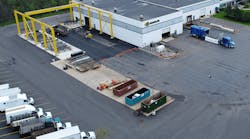Latest from Fleet Management
Work Truck Week 2025 Welcomes More Than 16,000
Sponsored
By Rachael Plant
Founded in 1884, John W. Danforth Company has evolved into an industry leader that specializes in providing engineered mechanical solutions throughout the Northeast. The company serves a wide variety of markets, including commercial, sports and entertainment, industrial, healthcare, higher education and K-12, government and advanced technology manufacturing, supplying turn-key solutions for HVAC, refrigeration, plumbing, critical environment, custom metal fabrication, energy performance and specialty mechanical projects.
More than 130 years have elapsed since Danforth’s inception, and there are no signs of the company slowing down. With a fleet of 300+ assets in operation—the reliability of which is essential to delivering exceptional quality of work—the company needed an equally exceptional fleet management software (FMS).
Company Objectives:
- Adopt a fleet database that hosts all fleet asset records
- Streamline maintenance vendor management
- Use an open platform that integrates with other systems
Spread Thin by Spreadsheets
Before adopting FMS, Danforth managed asset maintenance using spreadsheets, a process fostering both disorganization and poor tracking habits. One of the company’s biggest challenges was that it lacked a system of record for its assets, making it difficult to keep up with important documents, such as invoices and service histories. Additionally, without a system of record, data was hard to analyze, and not everyone who needed access to certain data could actually access it. Due to this, Danforth needed to implement a capable database that employees in the field could also access, easily and in real time.
Effectively Managing Maintenance Vendors
Trying to keep track of vehicle maintenance can be difficult, regardless of fleet size. With FMS, Danforth was able to take control of maintenance management using outsourced maintenance automation (OMA). OMA is a software integration that streamlines the outsourced maintenance process by automatically capturing and categorizing repair order data and by allowing for the automation of approvals and rejections based on customizable parameters. OMA helped Danforth easily manage its maintenance vendors and billing using electronic work orders and approvals, all in one convenient location.
Prior to OMA, the company had to create work orders from each of its service requests. Now it has a system with all of its vendors and can update work orders electronically. The company’s chosen software also adds information for things like differential service, as well as leverages data from fuel card mileage to help determine maintenance schedules.
Integrating Necessary Data
While shopping around for FMS, there were certain functionalities the team at Danforth knew they’d need, one of which was the ability to integrate other fleet solutions. After finding FMS with an open platform and numerous integrations, the company was able to begin using odometer updates—which were pulled into the FMS in real time from telematics devices installed in the vehicles—to help determine maintenance schedules for its assets.
This enables Danforth to maintain the health of its assets and prevent any potential downtime from unexpected issues. Having all the necessary fleet data stored in a comprehensive FMS has delivered tremendous insights and made managing assets much easier.
Automated diagnostic trouble code (DTC) notifications and vehicle locations are other great features of the integration functionality that Danforth takes advantage of. Knowing exactly where assets are located is a tremendous help for the company’s dispatchers.
Being in the Know
Since Danforth is a multi-functional contractor, it relies on a variety of assets that go beyond conventional vehicles. FMS enables the company to effectively track forklifts and other equipment by adding custom fields to classify and organize its data.Additionally, assets are grouped based on their classification. For example, assets in the fabrication and service divisions are assigned to a specific driver. However, assets in the construction division are constantly rotating, which makes vehicle assignments an important feature.
Having come to the purchasing table with its core objectives clearly defined, Danforth was able to find FMS that not only hit the mark, but exceeded expectations. As the company continues to grow and succeed, its chosen cloud-based FMS easily scales to match, with new features being added all the time.
Rachael Plant is a Content Marketing Specialist at Fleetio, a software company specializing in helping organizations track, analyze and improve their fleet operations. Have you determined the features and functionality you need from a fleet management software? Start your free trial to see if Fleetio is the perfect fit for your fleet!



